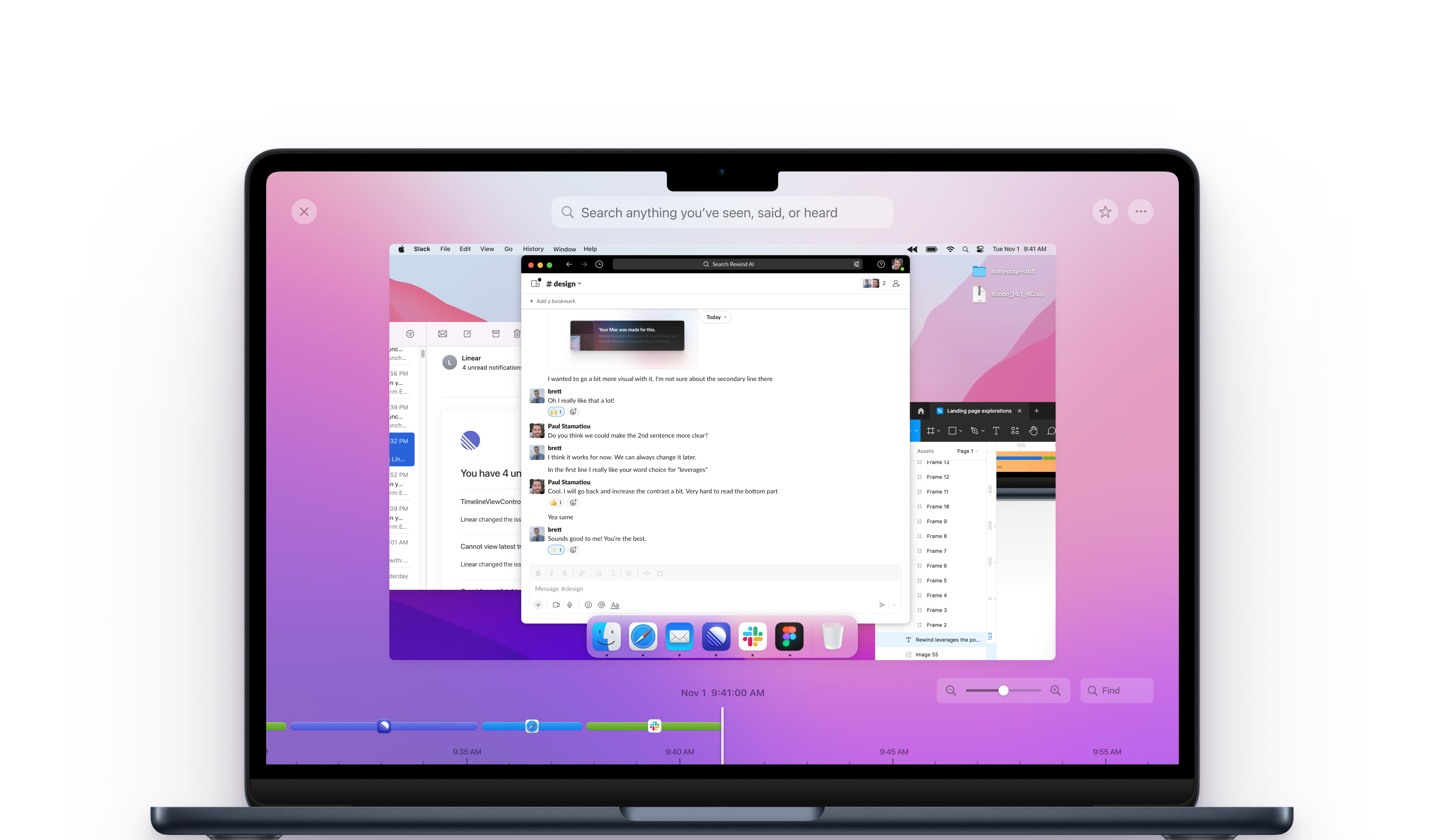While there have been quite a few attempts to disrupt search engines, Rewind may be the first I’ve ever seen try to revamp the way we search through our online lives. One app at a time.
Built by Dan Siroker, the co-founder and former chief executive of Optimizely, Rewind wants to help people with their memory. The startup, launching today, uses nifty tech to record how someone scrolls and chats through their day. It creates a searchable recording of what happened when, who said what during that Zoom meeting and every instance someone has ever brought up expense reporting hacks.
“The content of discussions, debates and decisions are often lost forever as soon as a meeting is over,” Siroker said. “With Rewind, you never have to worry about losing this content again….you can go back to the exact moment in a meeting you are looking for by simply searching for a word that was said, a word that appeared on your screen.”
Siroker compares the app to a hearing aid, which he says changed his life after he started to go deaf in his 20s. “To lose a sense and gain it back again felt like gaining a superpower,” Siroker said. After leaving Optimizely in October 2020, he began looking for different ways to augment human capability. According to LinkedIn, he started a foundation in 2018 to “fund and conduct scientific research in order to accelerate our path toward human mind emulation.”
In product form, this goal looks like Rewind. Siroker said that the startup “uses APIs to determine the specific app that is in focus at any given time,” and then creates a timeline of that behavior. It also uses an API to allow deep linking to websites, so people can open in chrome directly from search results.
Users don’t need to integrate with Gmail, Dropbox or Slack, but instead just can download and “rewind” to start capturing the apps. Put in practice, if, for example, you forget the URL of the landing page of a new rival app that someone mentioned during a developer stand-up, you can rewind – haha – through your day, find the moment in the meeting someone threw the link on the screen, copy the link and paste.
As for the “why now” question, Siroker had an immediate answer: “Apple Silicon (i.e. M1 and M2 chips). Without it, we couldn’t do what we do. We leverage every part of the System on a Chip (SoC) to do everything locally on your machine.”
Rewind claims that it compresses raw video recording data up to 3,750x times without a loss of quality; “that means even with the smallest hard drive you can buy from Apple today, you can store years of continuous recordings,” the company said in a statement provided to TechCrunch ahead of today’s announcement. (Apple is not an investor).
Rewind addresses one of the biggest challenges with any app – user trust – head on. The recordings are stored locally on individuals’ Mac computers. In theory, that means that the company doesn’t touch the data. Rewind says that only users have access to their data.
Siroker added that users can pause and delete recordings at any time, excluding specific apps like Signal or 1Password or go Incognito mode, saying that “by default, we don’t record Chrome Incognito or Safari private browsing windows).

Image Credits: Rewind
There are still some risks with storing a sensitive, all-encompassing repository of everything you’ve seen, said or heard on a machine. Malware could potentially tap into sensitive data if your computer is compromised, for example. There’s also the awkward dance of a Rewind user recording someone on their screen without their permission; which is illegal in some states.
Siroker said that he recommends users ask those they are recording for verbal permission, emphasizing that only the user can have access to the recordings. Still, a user with Rewind may feel less inclined to complain about their corporate parents or share personal stories knowing that there is a recording of it somewhere (delete button doesn’t retroactively work, unfortunately).
“While the laws differ from state to state, we believe privacy is so important that we recommend users of our product hold themselves accountable to a much higher standard than the bare legal minimum, ” Siroker said, speaking about proactive recording consent. “Not only is this the safest approach legally, but it is also just the right thing to do.”
As for how this makes people better at remembering instead of just better at not losing track of random things throughout their workday, the jury is still out. If you look through your day, that doesn’t necessarily mean you’ll remember things more, it may just mean you have more stored memories at your fingertips. Which I guess is a memory aid, but definitely one that requires you to be sitting down at your computer.
“The long-term vision is giving humans perfect memory, the product today is all about search,” Siroker said. “That’s where we can have the biggest impact. If you think about it, if we all already had perfect memory we wouldn’t need to search our emails, texts, dcos etc to find things we’ve seen before. We would just remember them.”
So far, the company has raised $10 million at a $75 million valuation in a round led by Andreessen Horowitz (a16z), with participation from First Round Capital and others.
The app is currently free, Siroker says, but there will be a freemium monthly subscription down the road. And, despite his history in helping companies better market advertising campaigns, Siroker says that Rewind “will never sell your data or do advertising.”
Rewind wants to revamp how you remember, with millions from a16z by Natasha Mascarenhas originally published on TechCrunch















 English (US) ·
English (US) ·